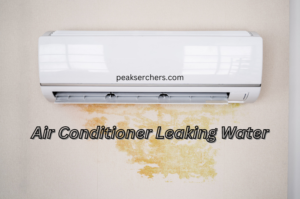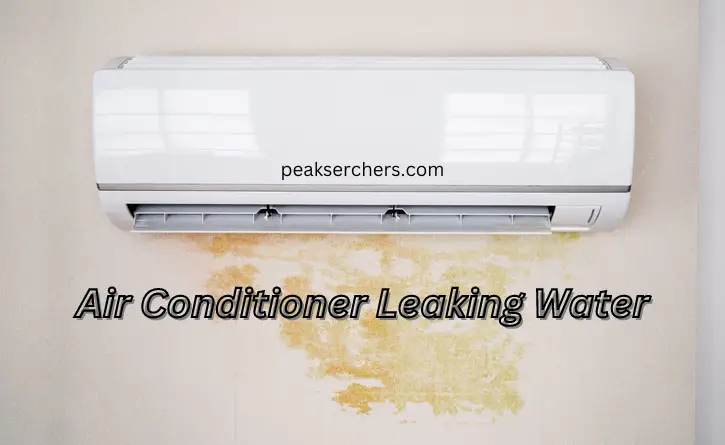Why Is My Air Conditioner Leaking Water? A Comprehensive Guide
Welcome to our comprehensive guide on My Air Conditioner Leaking Water. As experts in the field of HVAC systems, we understand the frustration and concern that arises when you discover water leakage from your air conditioner.
In this article, we will delve into the common causes of air conditioner water leaks, and their potential implications, and offer practical solutions to help you troubleshoot and resolve this issue.
Whether you’re a homeowner or a business owner, this guide aims to provide you with the information you need to address air conditioner water leaks effectively.

Understanding the Causes of Air Conditioner Water Leaks
Improper Installation
One of the primary reasons for air conditioner water leaks is improper installation. If your air conditioner was not installed correctly, it can lead to various issues, including water leakage. Improperly installed condensate drain lines, for instance, can cause water to accumulate and overflow, resulting in leaks. It is crucial to have your air conditioner installed by a qualified professional to ensure it is done accurately, preventing potential problems in the future.
Clogged or Blocked Drainage System
Over time, the drainage system of your air conditioner can become clogged or blocked, impeding the proper flow of water. When the condensate drain line gets obstructed by debris, dirt, or mold, the water has nowhere to go and may back up, resulting in leakage. Regular maintenance, including cleaning and clearing the drainage system, is essential to prevent blockages and maintain optimal functionality.
Insufficient Insulation
In some cases, air conditioner water leaks can be attributed to insufficient insulation. When the temperature of the cool air inside the unit comes into contact with warm air outside, condensation occurs. If the insulation surrounding the air conditioner is inadequate, excessive condensation can accumulate and cause leakage. Ensuring proper insulation around your unit can help mitigate this problem.
Low Refrigerant Levels
Low refrigerant levels can also contribute to air conditioner water leaks. When the refrigerant is insufficient, the evaporator coil may freeze, causing ice buildup. Ice can overwhelm the drain pan’s capacity as ice melts, leading to water leakage. If you suspect low refrigerant levels, it is crucial to contact a professional HVAC technician to diagnose and address the issue appropriately.
Troubleshooting and Resolving Air Conditioner Water Leaks
Step 1: Check the Condensate Drain Line
Start by inspecting the condensate drain line for any visible signs of blockage or debris accumulation. If you notice any obstructions, gently remove them using a small brush or by flushing the line with a mixture of warm water and mild detergent. Ensure the drain line is clear and free from any blockages before proceeding.
Step 2: Clean the Drain Pan
Next, locate the drain pan, which collects the condensate water. Remove the pan carefully and clean it thoroughly to eliminate any dirt, mold, or algae buildup. Use a mixture of warm water and mild detergent, ensuring all residues are removed. Once cleaned, place the drain pan back securely into its position.
Step 3: Inspect and Replace Filters
Dirty or clogged air filters can hinder proper airflow, leading to excessive condensation and potential water leaks. Check your air filters regularly and replace them if they appear dirty or damaged. Clean air filters not only improve the overall performance of your air conditioner but also help prevent water leakage issues.
Step 4: Assess Refrigerant Levels
If you’ve followed the above steps and are still experiencing air conditioner water leaks, it is advisable to consult a professional HVAC technician to assess the refrigerant levels and diagnose any potential issues with your unit. They have the necessary tools and expertise to identify refrigerant leaks and recharge the system if needed.
Also read: How Do You Protect An Air Conditioner In The Winter? A Step By Step Guide
FAQ’s
Can I still use my AC if it’s leaking water?
Yes, you can continue using your air conditioner if it’s leaking water, but it is highly recommended to take some precautions and address the issue promptly. Here are a few considerations to keep in mind:
- Safety first: Ensure that the water leakage does not pose any immediate safety hazards, such as electrical issues or slipping hazards. If you notice any electrical problems or a significant amount of water pooling, it is advisable to turn off the air conditioner and seek professional assistance.
- Monitor the situation: Keep an eye on the amount of water leakage. If it is a minor drip or occasional moisture, you can place a container or towel under the unit to collect the water and prevent it from damaging your surroundings. However, if the leakage is excessive or consistent, it is best to limit the use of the air conditioner and have it inspected by a professional.
- Address the problem: While using your air conditioner with a water leak is possible, it is crucial to address the underlying issue as soon as possible. Ignoring the problem may lead to further damage to your unit or potential mold growth. Follow the troubleshooting steps mentioned in the previous article to identify and resolve the cause of the leakage. If you’re unable to troubleshoot the problem on your own, it’s recommended to contact a qualified HVAC technician for assistance.
Is water dripping from AC dangerous?
Water dripping from an air conditioner can potentially be dangerous depending on the specific circumstances. While a small amount of condensation is normal during the operation of an air conditioner, excessive water dripping or leakage can pose risks. Here are some considerations:
- Electrical hazards: If water drips onto electrical components or wiring within the air conditioner, it can cause electrical malfunctions or even lead to a short circuit. This poses a potential fire hazard and can endanger the safety of your home or property.
- Slip and fall hazards: Water dripping from an air conditioner can create wet surfaces, which increases the risk of slips and falls. This is especially concerning if the water accumulates on smooth or slippery flooring, such as tile or hardwood. It’s important to ensure the water is promptly addressed to prevent accidents or injuries.
- Mold and mildew growth: Excessive water dripping or leakage can create a moist environment that promotes the growth of mold and mildew. Prolonged exposure to these contaminants can negatively affect indoor air quality and potentially cause respiratory issues or allergic reactions.
While a small amount of water dripping from your air conditioner may not be immediately dangerous, it is crucial to investigate the cause and address the issue promptly.
Water dripping from split ac indoor unit?
Water dripping from the indoor unit of a split air conditioner is a common issue that requires attention. Here are some potential causes and recommended actions to address the problem:
- Clogged or blocked condensate drain line: The most frequent reason for water dripping from a split AC indoor unit is a clogged or blocked condensate drain line. The drain line is responsible for carrying away the condensation produced by the cooling process. If it becomes obstructed by dirt, debris, or mold, the water may back up and drip from the indoor unit. To resolve this issue, you can follow the steps outlined in the troubleshooting section of our previous article to check and clear the condensate drain line.
- Improper installation: In some cases, incorrect installation of the air conditioner can lead to water leakage. If the unit is not properly leveled or the condensate drain line is not correctly connected, it can result in water dripping from the indoor unit. To address this, it is advisable to contact a professional HVAC technician who can assess the installation and make any necessary adjustments or repairs.
- Frozen evaporator coil: Another potential cause of water dripping is a frozen evaporator coil. When the coil freezes, it can produce excess condensation that overwhelms the drain pan’s capacity, leading to water leakage. This issue can be caused by factors such as low refrigerant levels, dirty air filters, or restricted airflow. It is recommended to turn off the air conditioner and contact a professional technician to diagnose and rectify the problem.
If you experience water dripping from the indoor unit of your split air conditioner, it is crucial to address the issue promptly to prevent further damage to the unit and potential hazards.
Why is my air conditioner leaking water outside?
Here are some possible reasons for water leakage outside the unit:
- Condensate drain line blockage: The condensate drain line carries the condensation produced by your air conditioner away from the unit. If this drain line becomes clogged or blocked, it can cause water to overflow and leak outside. Debris, dirt, mold, or algae growth can all contribute to the blockage. Cleaning or clearing the condensate drain line as outlined in the troubleshooting steps mentioned earlier can help resolve this issue.
- Improperly installed drain line: If the condensate drain line is not correctly installed, it can lead to water leakage outside the air conditioner. The drain line should have a proper downward slope to allow water to flow freely. If the slope is incorrect or there are any connection issues, water may accumulate and leak outside. It is recommended to have a professional HVAC technician inspect the installation and make any necessary adjustments.
- Frozen evaporator coil: A frozen evaporator coil can also cause water to leak outside the unit. When the coil freezes, it can lead to excessive condensation. As the ice melts, it can overflow the drain pan and result in water leakage. Low refrigerant levels, restricted airflow, or dirty air filters are common causes of a frozen evaporator coil. Contacting a professional technician to diagnose and address these underlying issues is advisable.
- Cracked or damaged condensate pan: The condensate pan is designed to collect the water produced by the air conditioner and direct it to the drain line. If the pan becomes cracked or damaged, water can leak outside instead of being properly drained. Inspecting the condensate pan for any signs of damage and replacing it if necessary can resolve this issue.
Also Read: What Does An Air Conditioner Capacitor Do? A Detailed Answer
Conclusion
Air conditioner water leaks can be an inconvenience and may indicate underlying issues within your HVAC system. By understanding the common causes and following the troubleshooting steps outlined in this guide.
You can effectively address and resolve the problem. Remember, regular maintenance, and proper installation. And timely professional assistance is crucial in ensuring your air conditioner operates optimally and remains leak-free.
If you require further assistance or have specific concerns about your air conditioner. Don’t hesitate to reach out to our team of experts who are always ready to help.


